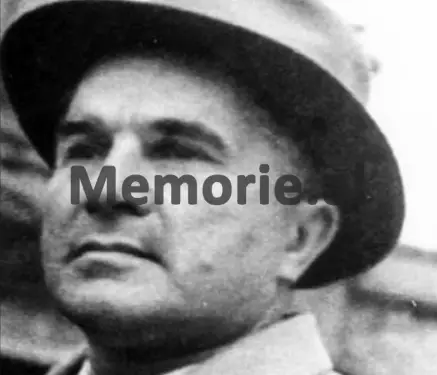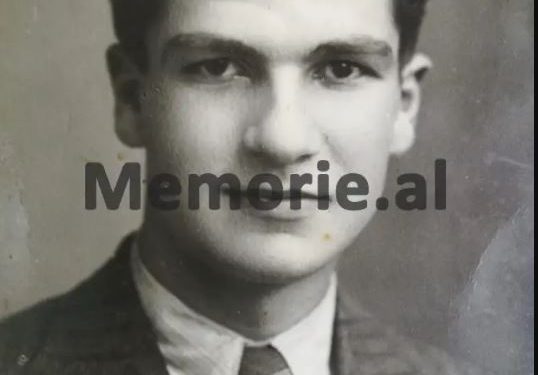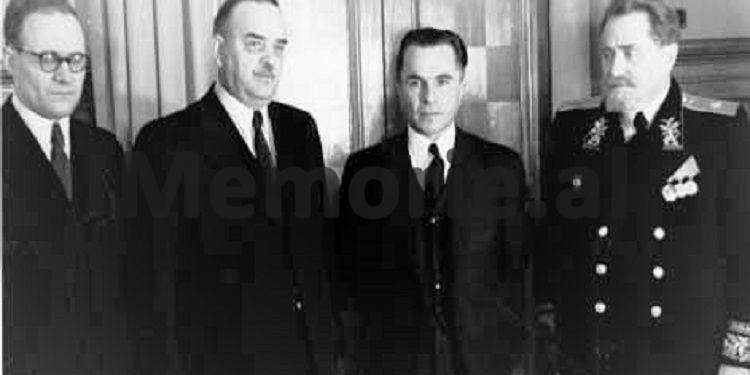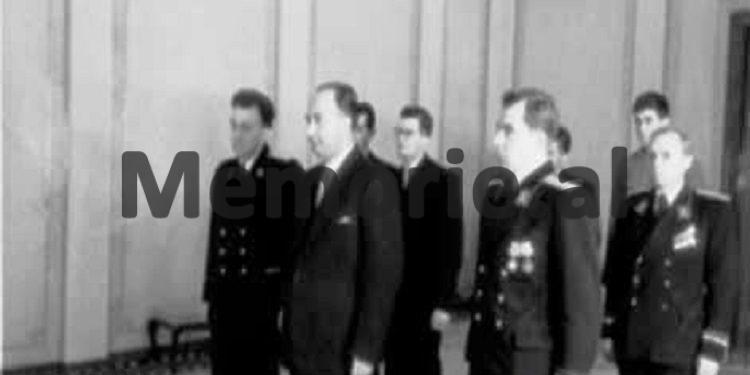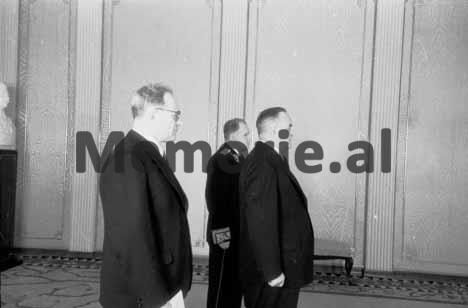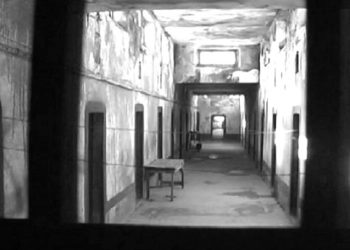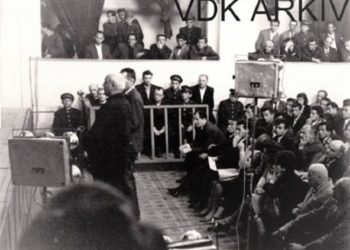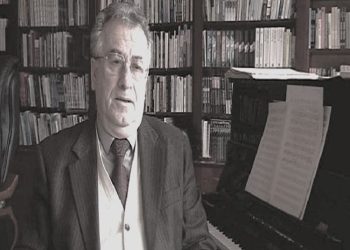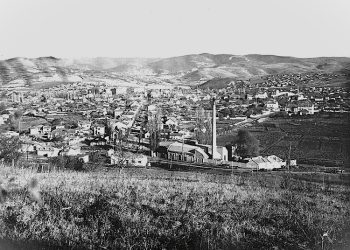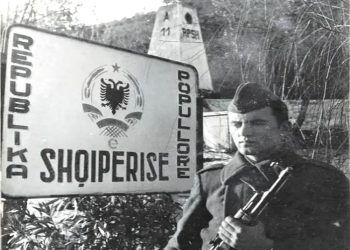By Belina Budini
Part One
Memorie.al / A letter can turn your life around and this is what happened to Koço Tashko, the protagonist of Albanian communism in the early years, a Harvard graduate, then seduced by communist ideas and the sucker of one of the noble families of Korça at the time, the Tashkos. It is about a letter that Koço Tashko addressed to the Comintern (Communist International) but that never reached the Comintern. Destined to inform this organization that united and led all the communist parties of the world and that had its headquarters in Moscow, it arrived where it was not supposed to. In the hands of Enver Hoxha and Miladin Popovic. Fatality.
His complaints and the reformist and humane current that Koço Tashko aspired to, although through the ideology of communism, did not fit the rest of the party and especially not Enver Hoxha, as was later observed. Concerned by the way Miladin Popovici, who acts not as an advisor but as an all-powerful chairman, leads the party, Koço Tashko through this letter, asks for help from the Comintern. Only a year after the Communist Party was founded.
On the other hand, Koço Tashko was the Comintern’s own envoy to Albania, since 1938, to establish the Communist Party and reported for the Communist International. However, Enver Hoxha did not destroy this letter and it was found in the archive of the Albanian People’s Liberation Army, while today it is kept in the Central State Archive: Fund 14, File 5. The Albanian communists did not know anything about this letter, but being imprisoned in Burrel by Enver Hoxha, Koço Tashko told some of his fellow sufferers about the vicissitudes of the letter in question.
The trial for the letter
After they managed to seize the letter from Tashko, Miladin and Enver gave him a real trial. They threatened to expel him from the party, to shoot him, etc. A deadly letter. And it was precisely Miladin Popovic who had removed Koço Tashko from the party leadership, since he preferred, as subsequent history proves, Enver Hoxha to put him in charge. After this letter, Koço Tashko was ordered and forced to shut up. From now on, he would only be on the periphery and the denigration did not delay.
However, it seems strange how this letter was not destroyed by Enver Hoxha?! It was supposedly left in oblivion and the communists were not informed about its content. That it did not reach the Comintern is also confirmed by the historian Nina Smirnova, who in the article published in the Russian magazine “Vaprosi Istoru”, no. 2, year 199…. writes that; this letter does not exist in the documents of the Comintern archive. Of course, the letter would not be mentioned anywhere in the history of the Communist Party or, in the history of the War and the dictatorship period, which was written and manipulated as is now known.
Unknown page of the CCP
One of the few documents that has remained to prove in black and white, the different story, that is, the other side of the history of the beginnings of the CPA. This letter, but not only this, but also many other documents, make it clear that Enver Hoxha was not the creator of the CPA, that the main efforts to unite the groups and create the Communist Party were made by Koço Tashko. And it turns out that it is not true either that the main organizer of the Peza Conference was Enver Hoxha: the initiator was Koço Tashko, while the organizers were Ymer Dishnica, Nako Spiru, Mustafa Gjinishi. On the other hand, according to the documents, Enver Hoxha himself stated in the Berat plenum that he went to Peza the day before the opening of the Conference and found the report he gave there ready.
Smelling the problems
It is very early for the CPA and yet the problems are there. Koço Tashko did not escape them and he did not lack the courage to report them to the Communist International. In this letter, he harshly criticizes the Provisional Central Committee and Miladin, especially for abandoning the Kosovo issue, but also for the attitude towards nationalists and the Albanian army, for sectarianism, for undemocratic leadership…! And then it turned out that these were the main basis of Enver Hoxha’s mistakes, in collaboration with Miladin Popovic.
Tragic fate
And the punishment for Koço Tashko would not be delayed. Enver Hoxha had not forgotten that letter. In 1960, Koço Tashko was exiled with his family, and in 1969, he was locked up in the Burrel prison and suffered 10 years in prison. In 1979, already very old and sick, he was exiled again and died in 1984, while his grave is still in Mamurras. To his prison comrades, some of whom are living witnesses of these words, he said: “The only crime I have committed against my people is that I took Enver Hoxha to the meeting of the Communist Groups, for the creation of the party, and then proposed him to be elected to the Central Committee”.
The protagonist, who was Koço Tashko?
He died in exile, on April 30, 1984. The brother of the famous singer Tefta Tashko and the well-known patriot Thanas Tashko, he was born in Fayun, Egypt, where his family had moved to live, on July 14, 1899. His father, Thanas Tashko, was one of the most prominent activists of the national movement. He grew up in this house, where the problems of the National Renaissance were judged in the flag room. He went to the USA and took an active part in the patriotic movement of the Albanian emigration, in the “Vatra” organization, the “Dielli” newspaper. He graduated from Harvard University in political economy.
He was appointed consul of Albania in the USA and after the fall of the “Noli” government, he actively participated in the democratic movement in emigration. Then, attracted by communist ideas, he went to Moscow, where he was activated by the Comintern and in 1938, he was sent by it to Albania, to establish the Albanian Communist Party. After 62 years, the letter that Koço Tashko wrote to send to the Comintern was published in the fall of 1942.
Although the letter did not reach its destination, it determined the fate of the writer, who was later imprisoned for ten years and exiled. In the first part of this document, Koço Tashko speaks of the fierce and personal struggle within the Communist Party in its early days and the concern for the unfair position towards Kosovo
Koço Tashko’s letter to the Comintern
“With the formation of the party, merging the three main groups, the communist movement in Albania received a great boost not only because of the new situation created by Hitler’s Germany’s entry into the war against the Soviet Union, not only because of the discredit suffered by Italian fascism after the war with Greece and its administrative incompetence.
This was due not only to the general difficulty of living and the antagonisms in the ruling classes, but also to the elimination of group warfare, the elimination of cadre theories that were anti-Lenin-Stalin and opposed the movement of the masses, the unification of communist forces, and the organizational skills and experience of the two comrades (Miladin Popovici and Dusan Mugosha) whom we had invited through the Yugoslav Party to help us in the fusion of communist forces.
In order to facilitate the process of forming the Party, I had proposed in Peja (September 1941), to the Regional Committee for Kosovo and Metohija of the Yugoslav Communist Party (when I had gone there to seek the mediation of the Yugoslav Party for the liquidation of groups in Albania), my exclusion from the Central Committee that would be established in Albania, so as to facilitate the exclusion of the leaders of other groups, who had been the creators of anti-Lenin-Stalin theories, theories against the movement of the masses.
My proposal was repeated and accepted at the First Conference (Meeting of Communist Groups for the establishment of the CPA in November 1941), which formed the Party. So, for the Provisional Central Committee, I proposed to Comrade Miladin, completely new elements from the three groups, elements that I believed were untainted or, less tainted with the spirit of the groups, or equipped with qualities that assured me that they would be able to shake that spirit away from themselves.
On the other hand, I was fully aware that the comrades proposed by me from all the groups, no matter how sacrificed for the cause and unsparing in their work, did not have the proper political preparation to be members of the Central Committee (this fact was also pointed out to me by Comrade Miladin), that is, to understand the political and economic problems of Albania in a sufficient way, to ascertain at any time the objective situation, the role of subjective force and to predict future situations.
In addition, due to political immaturity, the comrades who were proposed and accepted into the Central Committee had in their previous groups members who accepted the personal leadership of the group leaders (for example, my leadership) and thus presented the risk that in the new Central Committee they would continue to be under the leadership of one person, instead of being themselves contributors to the political leadership of the Central Committee of the CPSU. I hoped that these main shortcomings of theirs would be eliminated, until the Party Congress convened, by the presence in the Central Committee as instructors of two comrades from the Yugoslav Party, comrades Miladin and Dusan.
In short, I handed over all responsibility to these comrades (although I had no idea of their past), based solely on the recommendation of the Central Committee for Kosovo and Metohija of the Yugoslav Communist Party and my conviction that no matter how bad the results were, we would not have been worse off than if the war of the groups had continued or if I had been on the Central Committee, together with the leaders of the other groups, with whom (I with them and they with me), we had had a fierce personal war.
As long as the Party Congress had not been convened and as long as a representative of the Comintern had not arrived (whom Comrade Miladin had assured me would come), I, completely from the outside, since from the inside I had no opportunity, since I was not even a cell leader, to participate at least in the activities of Tirana, maintained a vigilance that was very necessary, since the Yugoslav comrades were unaware of the Albanian problems and since I had to give the report to the Comintern or to its representative, who I hoped would come before the Congress.
This report was requested by the Comintern based on the task it had assigned me in 1937. I repeat, not only have I not been to any of the forums so that I could be informed, but also the comrades of my group have either been afraid to talk to me, lest they be called “groupies” or, they have talked to me about group work and I have been the first to fight them and report and thus make the comrades of my former group (those with group tendencies or, with dissatisfaction) turn against me.
Since March of this year, therefore, I have constantly made remarks to comrade Miladin, which he has not received well. My remarks have been contrary to the solutions he has given to the issues of the Party, solutions that, in my opinion, have been copied from the situation of the war in Yugoslavia, that is, the left in Albania. These issues are:
1 – The Kosovo issue;
2 – The Albanian Army Issue;
3 – The Nationalist Issue and the National Liberation War;
4 – The Solution of Internal Problems Based on an Underestimation of the Forces of the External Enemy.
Before we get into this issue, we can describe the situation in Albania as follows: Hatred for the occupier is great, but fascism prevents the Albanian people from joining the Movement, mainly presenting these three things:
The Gogol of Serbia and Greece,
The indulgence of the fact that the Muslim Albanians, who are the overwhelming majority of the people, have in the past been the ruling race, both inside Albania against other religions, and outside, against the peoples enslaved by the Ottoman Empire; and the vow that in the future, they will again be the “ruling race” in the fascistized Balkans;
The fact that Albania is a port of entry for Italy in the Balkans results in much greater activity than in Greece and Yugoslavia, at the same time with a better food situation and a temporizing policy. On the other hand, the “leftism” of the Party has made it difficult for the people to move from the passivity in which fascism has placed them, to the action that the Party demands of them.
The Party enjoys the sympathy of the people but not the support in action (in Kosovo it does not enjoy sympathy, on the contrary, the anti-communist propaganda of Mustafa Kruja has been successful). Before April 7, 1942, the anniversary of the occupation of Albania, the people participated in the demonstrations, but on this April 7, the Albanian people did not participate. Those days, the first punitive anti-communist laws of Mustafa Kruja were proclaimed.
The demonstrations of this anniversary of the occupation of Albania therefore remain simply demonstrations of organized cadres and sympathizers, and today, six months later, the Party’s actions in cities and in partisan detachments are actions of organized cadres and sympathizers (it is said that the action in Skrapar, which took place in mid-September, led by the Korça Regional Committee, had the support of a part of the peasantry, but we still do not know to what extent).
So the Party is faced with the task of moving from a situation where the people of Albania are sympathetic spectators to a situation where the people enter into the dance of actions, a transition that is necessary to secure the Party against isolation and the eventuality of a broad reaction. In this regard, I hope that the results of the Conference with the nationalists, which was held in Peja on September 16, will contribute.
The Kosovo issues!
The Party has systematically remained silent about the Albanians of Kosovo, who constitute 60-65% of the population there and 2/3 of the population of old Albania (the borders of 1913), saying (the words of comrade Miladin) that this issue does not concern us, but belongs to the Yugoslav Communist Party. The result has been that in the field of internal propaganda, here and in Kosovo, Mustafa Kruja has had a free hand.
In March-April 1942, a proclamation in Albanian was published, addressed to the Albanians of Kosovo, by the Regional Committee for Kosovo and Metohija of the Yugoslav Communist Party. Under this signature was also that of the AKP. The fascist regime immediately seized upon this proclamation, reprinted it in its newspapers, printed it on good paper as a government tract and distributed it in Kosovo and Albania, to prove that the Albanian communists had left Kosovo to Serbia. /Memorie.al




